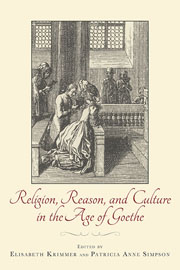Book contents
- Frontmatter
- Contents
- Acknowledgments
- Introduction
- I Wieland and Herder
- II Schiller and Goethe
- III Kleist and Hölderlin
- 6 Saint Mary's Two Bodies: Religion and Enlightenment in Kleist
- 7 Catholic Conversion and the End of Enlightenment in Religious and Literary Discourses
- 8 Sacred Maternity and Secular Sons: Hölderlin's Madonna as Muse
- IV Leibniz, Spinoza, and Their Legacy
- Notes on the Contributors
- Index
7 - Catholic Conversion and the End of Enlightenment in Religious and Literary Discourses
from III - Kleist and Hölderlin
Published online by Cambridge University Press: 05 December 2013
- Frontmatter
- Contents
- Acknowledgments
- Introduction
- I Wieland and Herder
- II Schiller and Goethe
- III Kleist and Hölderlin
- 6 Saint Mary's Two Bodies: Religion and Enlightenment in Kleist
- 7 Catholic Conversion and the End of Enlightenment in Religious and Literary Discourses
- 8 Sacred Maternity and Secular Sons: Hölderlin's Madonna as Muse
- IV Leibniz, Spinoza, and Their Legacy
- Notes on the Contributors
- Index
Summary
Stories of conversions from Protestantism to Catholicism received a great deal of attention in Germany during the first decade of the nineteenth century. Johann Heinrich Voß's pamphlet Wie ward Fritz Stolberg ein Unfreier? (How Did Fritz Stolberg Become Unliberated?, 1819) analyzes his friend Friedrich Leopold Stolberg's conversion to Catholicism and mourns the loss of their friendship. Stolberg's conversion, from his assault on Schiller's “Die Götter Griechenlandes” (The Gods of Greece, 1788) to his marriage to a Catholic woman in 1790, occurred during a public struggle over the ethics of conversion. Enlightenment thinkers such as Voß, Klopstock, and Goethe saw membership in the Catholic Church as a relinquishment of freedom and agency: Catholics allowed their religious institution to make their decisions for them, so they were seen as voluntary slaves to higher authorities and as refusing to take on the responsibility of thinking for themselves—victims of what Werner Schneiders calls a “Fremdaufklärung” or enlightenment by others. Protestants, on the other hand, saw themselves as exercising their Kantian right to use their own understanding, and were thus practicing self-liberation (“Selbstbefreiung,” Schneiders 176) and self-enlightenment (“Selbstaufklärung,” Schneiders 177). True enlightenment demands that the individual assume responsibility for his own thinking, rejecting knowledge that is simply transmitted by those in power.
- Type
- Chapter
- Information
- Religion, Reason, and Culture in the Age of Goethe , pp. 166 - 186Publisher: Boydell & BrewerPrint publication year: 2013

